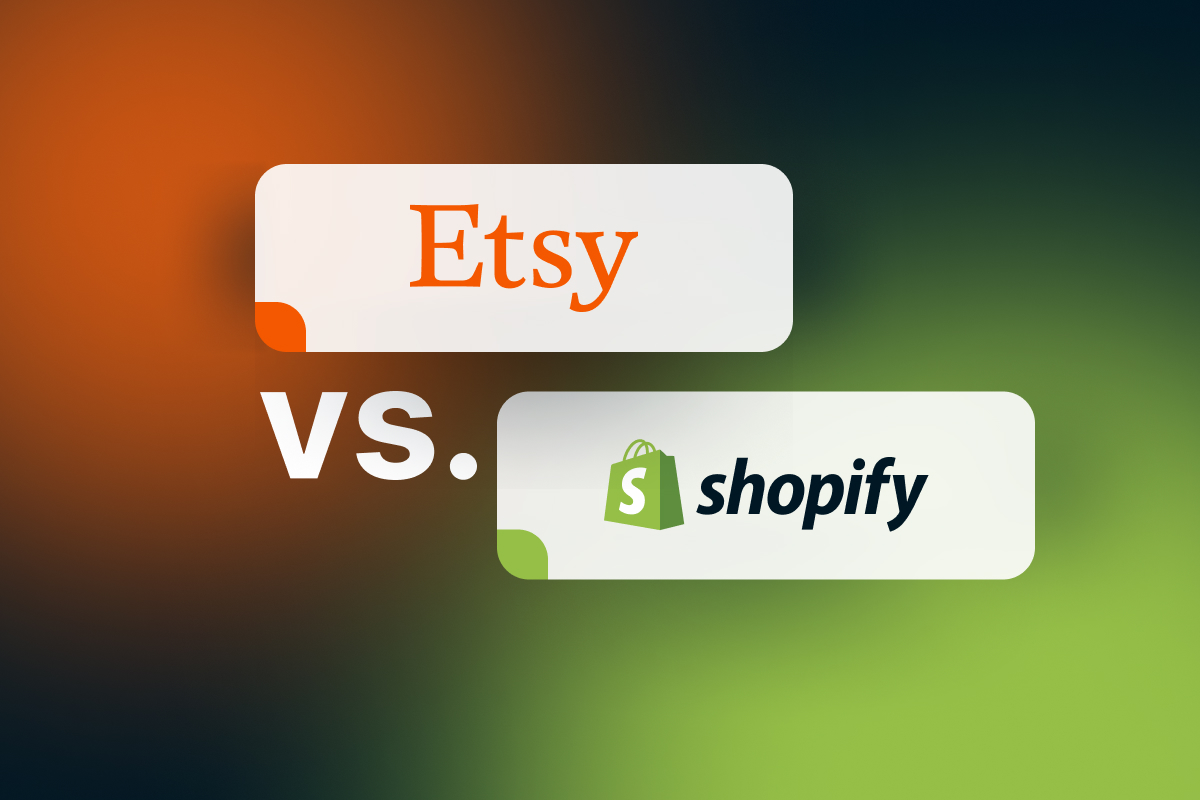Table of Contents
If you’re thinking of starting or growing your online business, you might wonder: is Shopify better than Etsy? After all, these are two of the most popular eCommerce platforms in the world, with millions of users and billions of dollars in sales.
Shopify and Etsy are very different in many ways. Shopify is a platform that lets you create your online store with full control over the design and features. Etsy is a marketplace that connects you with buyers looking for handmade, vintage, or unique items. Both have pros and cons, depending on what you’re selling and how you want to sell it.
In this article, we’ll compare Shopify and Etsy in detail, covering everything from pricing and fees to customer support. By the end of this article, you’ll have a clear idea of which is better for your business: Shopify or Etsy.
Ready to find out? Let’s dive in!
1. Shopify vs Etsy: Overview
So, is Shopify better than Etsy?
To answer this question, let’s look at how they compare in various aspects. These include features, pricing, design, marketing, and customer support.
Here’s how Shopify vs Etsy is compared head to head in terms of features, prices, and more:
| Feature | Shopify | Etsy |
| Pricing plans | Basic Shopify ($29/month), Shopify ($79/month), Advanced Shopify ($299/month), Plus ($2,000+/month) | Free plan (5% transaction fee + 3% + $0.25 payment processing fee), Etsy Plus ($10/month), Etsy Pattern ($15/month) |
| Transaction fees | 2.9% + $0.30 for online credit card payments (lower for higher plans), 0% for Shopify Payments | 5% for every sale + 3% + $0.25 payment processing fee |
| Custom domain | Yes (free for one year with an annual plan) | No (only subdomain of etsy.com) |
| Website design | Over 100 free and paid themes, fully customizable with a drag-and-drop editor or code | Limited customization options, only change banner, logo, colors, and fonts |
| Product types | Physical products, digital products, services, subscriptions | Physical products, digital products, craft supplies |
| Inventory management | Unlimited products, variants, and options, bulk import and export, inventory tracking | Unlimited products, up to 20 categories per product, up to 2 variations per product |
| Shipping options | Custom shipping rates and labels, integration with major carriers, free shipping option | Custom shipping rates and labels, integration with major carriers, free shipping option |
| Marketing tools | SEO features, email marketing, social media integration, blog platform, Shopify app store with over 8000 apps | SEO features, email marketing, social media integration, Etsy ads platform |
| Customer support | 24/7 phone, email, and live chat support | Email and community forum support |
💬 You might also be interested in:
- What Is Shopify and How Does It Work?
- What You Should Know about Etsy Marketplace
- Amazon Handmade vs Etsy: Which One Is Better?
1. Where Shopify Wins
Shopify is a powerful and flexible eCommerce platform that lets you create your own online store from scratch. You can choose from over 100 themes or customize your own with code. You can also add features and functionality with apps from the Shopify app store. In general, Shopify is great for entrepreneurs who want full control over their online presence.
Here are some areas where Shopify beats Etsy:
1.1 Lower transaction fees
One of the biggest advantages of Shopify over Etsy is the lower transaction fees. Shopify charges a flat fee of 2.9% + $0.30 for online credit card payments (lower for higher plans) and no additional fees if you use Shopify Payments as your payment gateway. This means you get to keep more of your profits.
On the other hand, Etsy charges a hefty 5% transaction fee for every sale you make on its platform. This is in addition to the 3% + $0.25 payment processing fee that applies to all payments. This means you end up paying more than 8% of your revenue to Etsy.
If you sell many products or have high-priced items, this can make a big difference in your bottom line. For example, if you sell $10,000 of products monthly on Shopify, you would pay $379 in fees. On Etsy, you would pay $899 in fees. That’s a difference of $520!
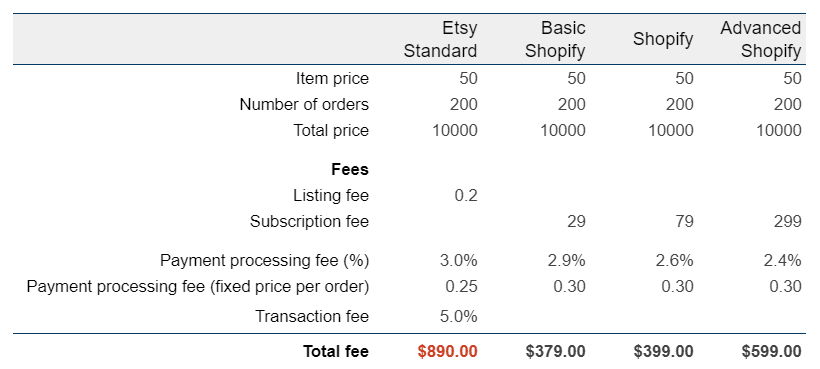
Image source
1.2 Customizable website of your own
Another strong point of Shopify over Etsy is having your own website with your domain name. This gives you more credibility and professionalism as a business owner. You can also customize your website to match your brand identity and style.
Shopify offers over 100 free and paid themes that you can use to design your website. You can also use the drag-and-drop editor or code to tweak every aspect of your site. You can add pages, menus, banners, logos, colors, fonts, and more.
Etsy does not allow you to have your own website or domain name. You can only have a subdomain of etsy.com (e.g., yourstore.etsy.com). This means Etsy’s branding and design limit you. You can only change a few store page elements, such as the banner, logo, colors, and fonts.
Having your own website gives you more freedom and flexibility to showcase your products and personality. It also helps you stand out from the crowd and attract more customers.
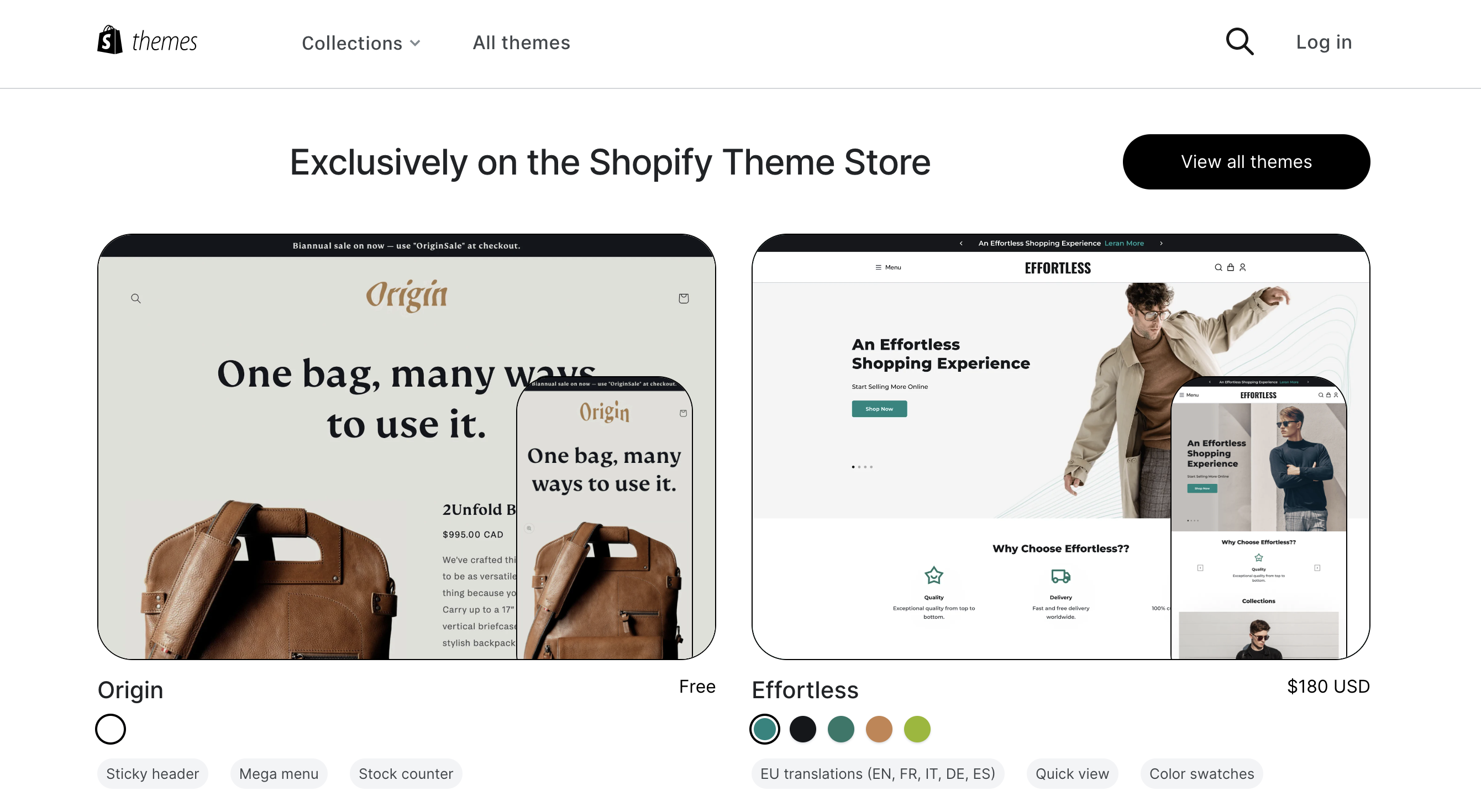
Shopify themes
1.3 Great for Omnichannel commerce
Shopify is also ideal for Omnichannel commerce. This means you can sell your products across multiple channels and platforms besides your website. For example, you can sell on Facebook Shop, Instagram Shop, Amazon, eBay, Google Shopping, and more.
Shopify integrates seamlessly with these channels and syncs your inventory and orders across them. This way, you can reach more customers and grow your sales hassle-free.
Meanwhile, Etsy does not offer omnichannel commerce options. You can only sell on Etsy’s platform or link to your own website (if you have one). This limits your exposure and potential revenue.
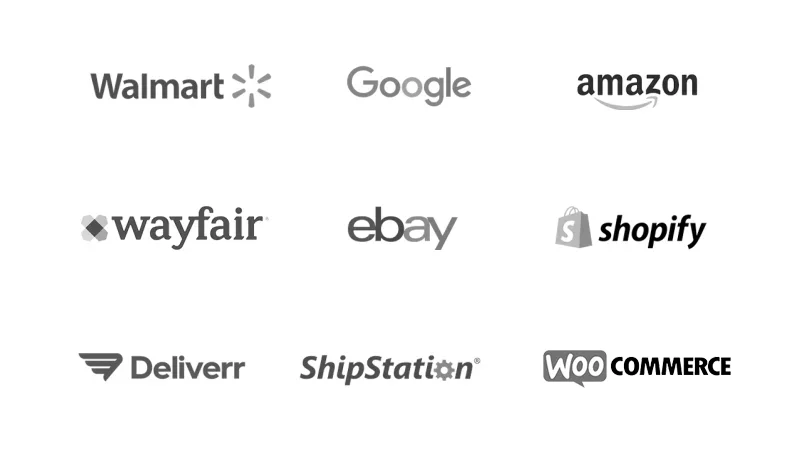
Shopify integrates with several platforms
2. Where Etsy Wins
Etsy is a popular online marketplace that connects sellers with buyers looking for handmade, vintage, or unique items. Etsy is great for artists, crafters, and makers who want to sell their creations to a niche audience. Etsy has over 90 million active buyers and over 4 million active sellers worldwide.
Here are some areas where Etsy beats Shopify:
2.1 Free plan available
One of the advantages of Etsy over Shopify is that it offers a free plan for sellers. You don’t have to pay monthly fees to list your products on Etsy. You only pay when you make a sale or use optional features like ads or premium plans.
On the other hand, Shopify does not have a free plan. You must pay at least $29 monthly to use its platform. This can be a barrier for some sellers who are just starting out or have a low budget. Luckily, Shopify does have free trial though.
Of course, the free plan on Etsy comes with some trade-offs. You must pay higher transaction fees, have less control over your store design, and compete with millions of other sellers on the same platform. But if you’re looking for a low-cost way to test the waters or sell occasionally, Etsy might be a good option.
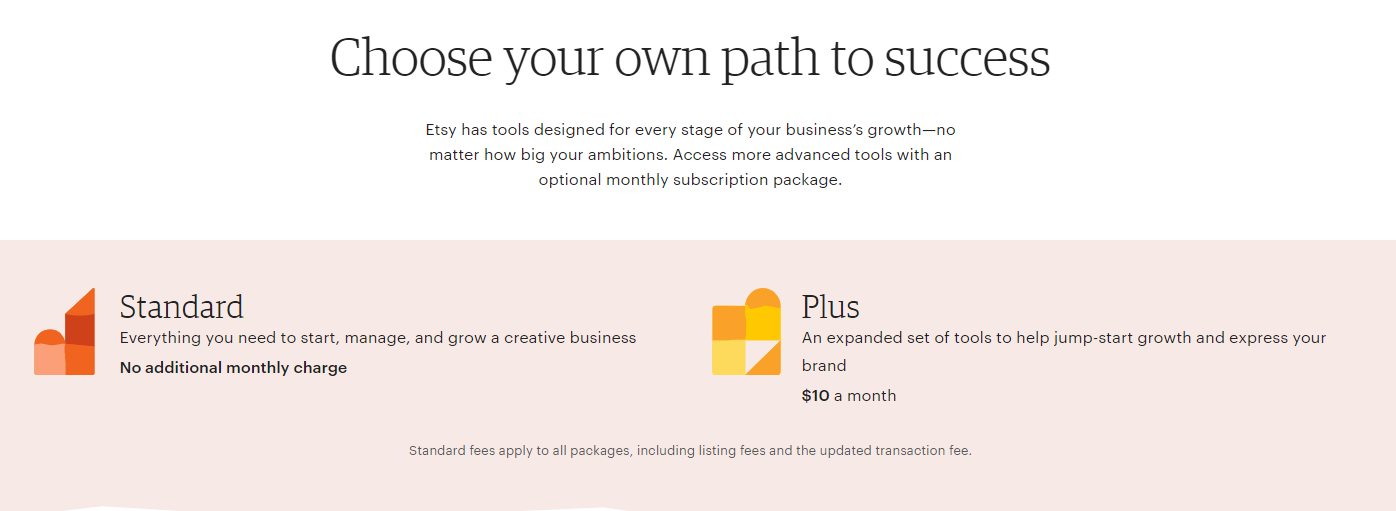
2.2 Built-in audience for handmade goods
Another benefit of Etsy over Shopify is its built-in audience for handmade goods. Etsy’s buyers seek unique, creative, and personal items they can’t find elsewhere. They appreciate the craftsmanship and story behind each product.
Shopify does not have a built-in audience. You must attract customers to your website through SEO, ads, social media, etc. This can be challenging and time-consuming, especially if you’re new or don’t have a strong brand presence.
Sell handmade goods that appeal to Etsy’s niche market. You might find customers and sell on Etsy easier than Shopify.
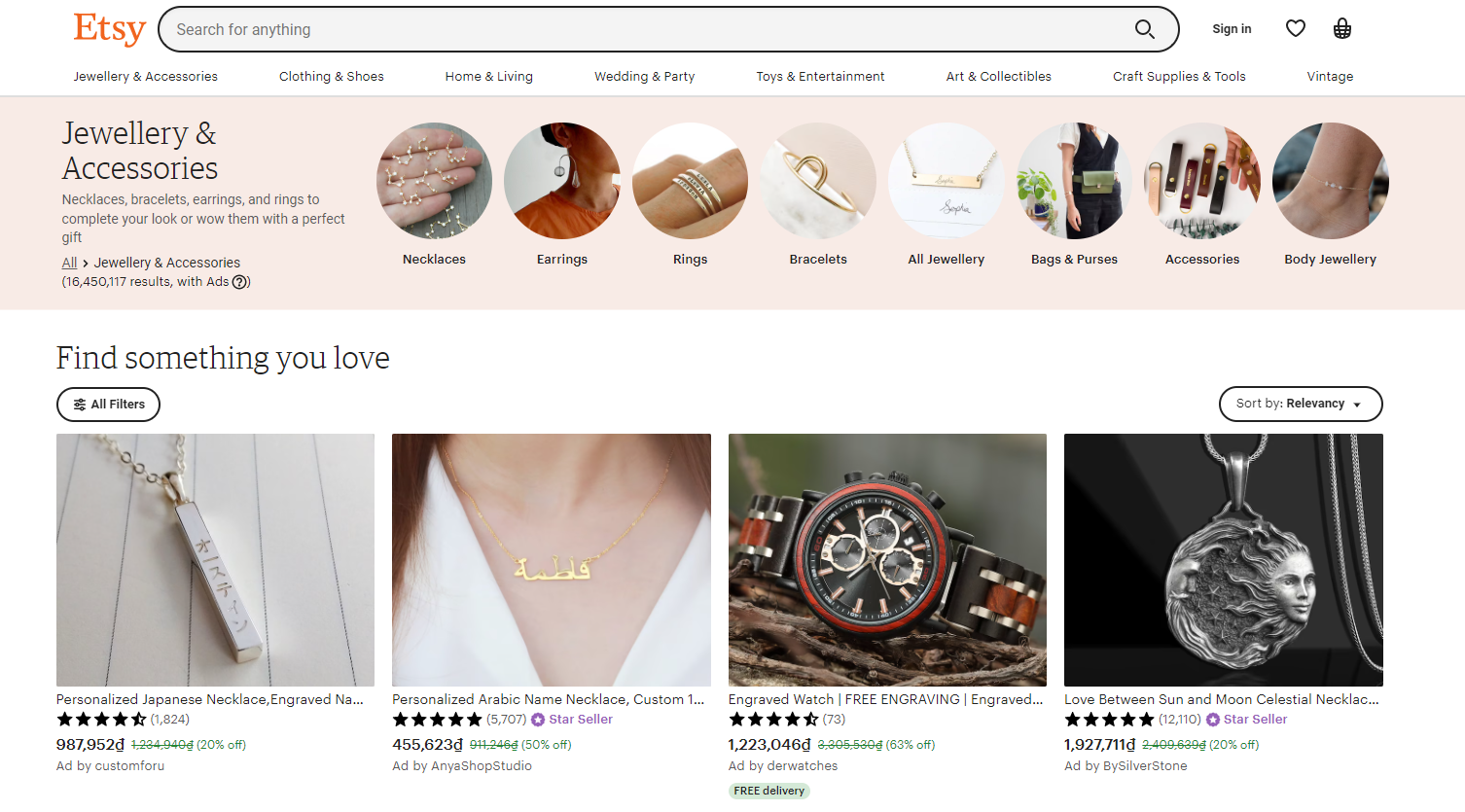
Etsy is heaven for handmade products
2.3 Easy store setup
Finally, Etsy wins over Shopify regarding ease of store setup. Etsy makes it very simple and quick to start selling online. You just need to create an account, choose a store name, upload some photos, write some descriptions, and set some prices. You don’t need any technical skills or experience to do this.
Shopify requires more steps and skills to set up your store. You must choose a plan, pick a theme, customize your site, add products, set up payments, shipping, taxes, etc. You might need some help from experts or tutorials to do this properly.
If you’re looking for a hassle-free way to start selling online without much fuss or a learning curve, Etsy might be a better choice than Shopify.
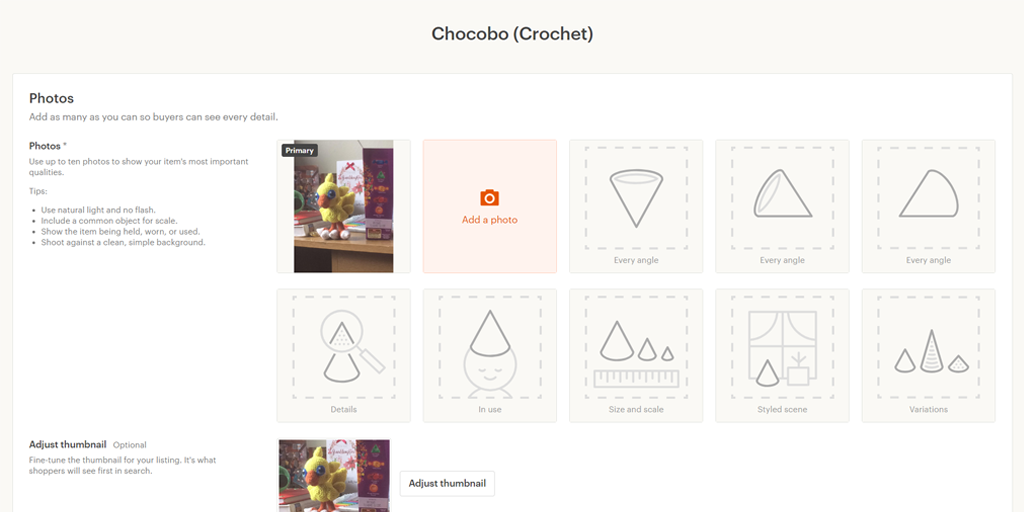
Etsy store is easy to setup
How to sell on Shopify compared with Etsy
As you can see, the answer to our question “Is Shopify better than Etsy” have yet to have answered. You might find one platform more suitable depending on your business goals, budget, and preferences.
You need to ask yourself these questions first:
- What products do you sell? If you sell handmade, vintage, or unique items, you have a better chance of finding customers on Etsy. If you sell physical, digital, or service-based products, you may want Shopify’s flexibility and features.
- How much control do you want over your website and brand? If you want to have your own domain name, website design, and features, you might choose Shopify. If you don’t mind having a subdomain of etsy.com and limited customization options, you might go with Etsy.
- How much are you willing to pay? If you want to pay lower transaction fees and keep more of your profits, you might opt for Shopify. If you don’t want to pay any monthly fees and only pay when you make a sale, you might pick Etsy.
- How do you plan to market your products? If you want to sell across multiple channels and platforms besides your own website, you might select Shopify. If you’re going to leverage Etsy’s built-in audience and niche market, you might choose Etsy.
Ultimately, the best way to determine which platform is better is to test them yourself. You can sign up for a $1 trial on Shopify or a free plan on Etsy and see how they work for you.
1. Pros & Cons of Selling on Shopify
Shopify is a great platform for entrepreneurs who want to create their own online store and have full control over their brand and website. It offers many features and functionality to help you grow your business and reach more customers.
Here are some of the pros and cons of selling on Shopify:
| Pros | Cons |
|
|
Shopify is best for business owners that:
- Want to have their own website and domain name
- Want to have complete control over their website design and features
- Want to pay lower transaction fees and keep more of their profits
- Want to sell across multiple channels and platforms besides their own website
- Have the budget and skills to set up and maintain their store
2. Pros & Cons of Selling on Etsy
Etsy is a popular platform for artists, crafters, and makers who want to sell handmade, vintage, or unique items. It has a large and loyal customer base looking for creative and personal products they can’t find elsewhere.
Here are some of the pros and cons of selling on Etsy:
| Pros | Cons |
|
|
Etsy is best for businesses that:
- Sell handmade, vintage, or print-on-demand products. We have an article on Shopify vs Etsy Print-on-demand comparison to make you a choice.
- Don’t want to pay any monthly fees or only sell occasionally
- Don’t mind having a subdomain of etsy.com
- Don’t need much customization or features for their store page
- Want to leverage Etsy’s built-in audience and niche market
Shopify vs Etsy: Pricing
Another important factor to consider when choosing between Shopify and Etsy is the pricing. How much does it cost to sell on each platform?
The answer depends on several factors, such as how much you sell, what features you need, and what payment methods you use. Both platforms have different pricing plans and fees that can affect your profitability.
Let’s have a quick comparison of their pricing plans and fees.
1. Etsy’s plans include:
- Free: No monthly fees, but high transaction fees (5% + 3% + $0.25 per sale)
- Plus: $10 per month, some extra features to enhance your store page
- Pattern: $15 per month, your own website with a custom domain name
All plans: Additional fees for currency conversion, offsite ads, and in-person selling
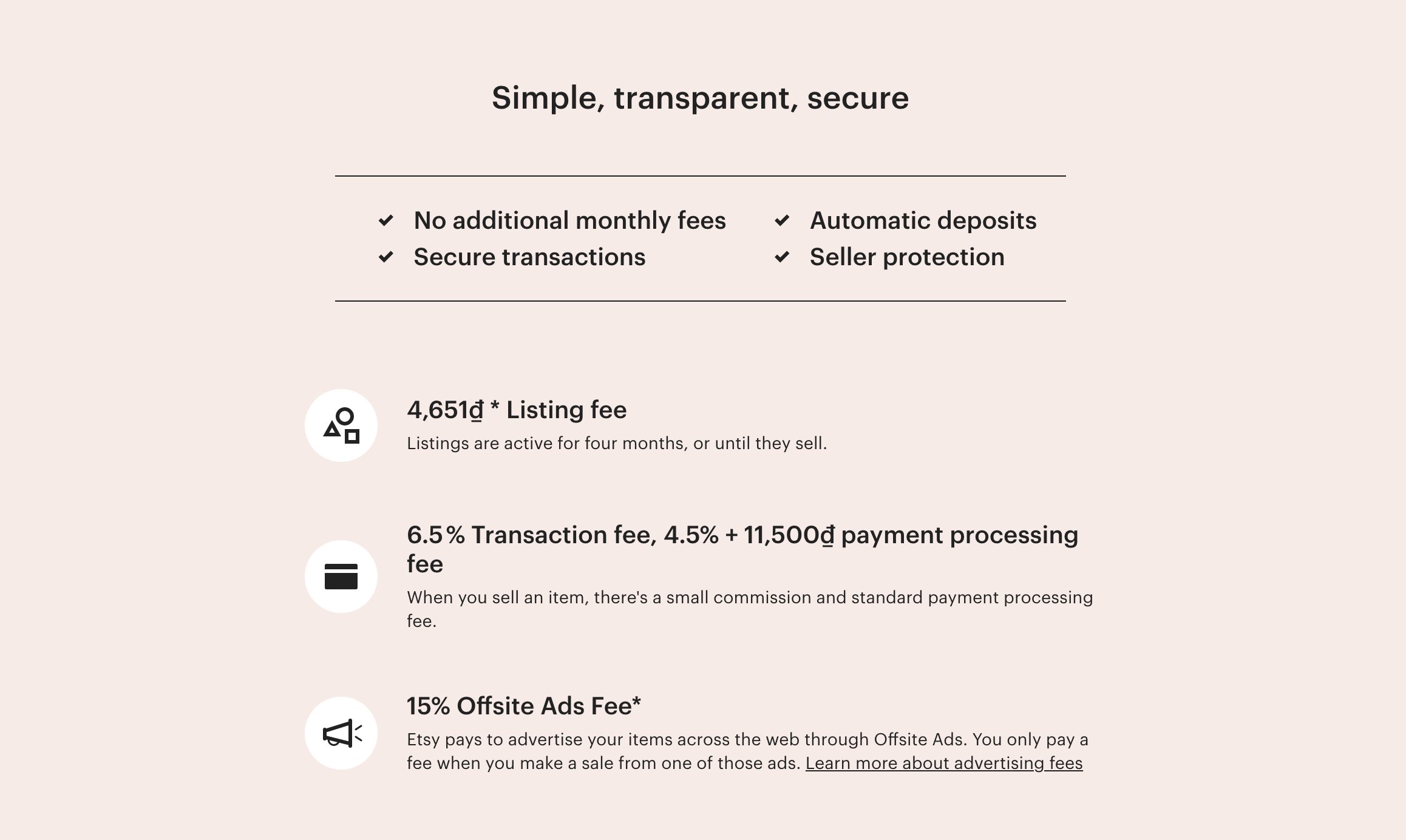
2. Shopify’s plans include:
- Starter: $5 per month, sell on other channels like Facebook Shop and Amazon
- Basic: $29 per month when billed annually, your own website with a custom domain name and some features like gift cards and discount codes
- Shopify: $79 per month when billed annually, more features and functionality than the Basic plan
- Advanced: $299 per month when billed annually, more features and functionality than the Shopify plan
- Plus: $2,000 per month and up, for large businesses and enterprises that need more scalability and customization
All plans: Lower transaction fees (2.9% + $0.30 or lower per sale) and no Shopify Payments fee if you use Shopify Payments as your payment gateway; otherwise, an additional fee of 2%, 1%, or 0.5% depending on your plan
If you pay monthly instead of annually, you will pay more for each plan. For example, the Basic plan costs $420 per year if you pay monthly but only $348 per year if you pay annually.
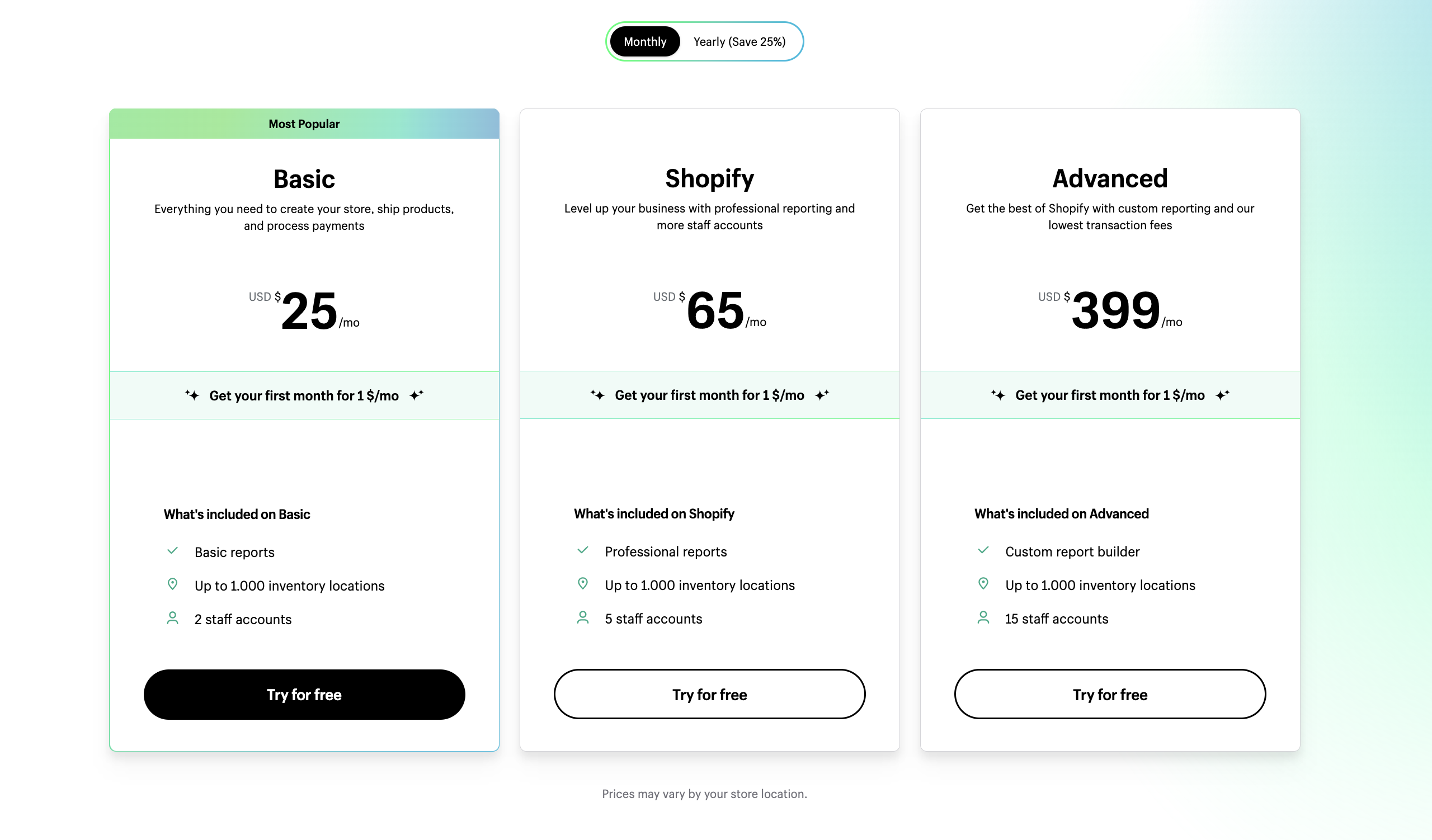
So, which platform is cheaper for you: Shopify or Etsy? Here are some tips to help you decide:
- Do you sell a lot of products or have high-priced items? Shopify might save you money because of the lower transaction fees.
- Do you sell a few products or have low-priced items? Etsy might save you money because of the free plan option.
- Do you need a lot of features and functionality for your store? Shopify might give you more value for your money because of the variety and flexibility of its plans and apps.
- Do you need minimal features and functionality for your store? Etsy might give you more value for your money because of the simplicity and ease of its platform.
Of course, these are not the only factors to consider. You must also consider other aspects like your product type, target market, brand identity, marketing strategy, customer support, etc.
The best way to find out which platform is cheaper is to do some calculations and comparisons based on your sales data and goals.
Shopify vs Etsy: Customer Support
Shopify and Etsy offer different types of customer support for their sellers. Shopify provides 24/7 phone, email, and live chat support for all its plans. While Etsy only provides email and community forum support for its sellers. Let’s see their pros and cons.
- Shopify’s customer support:
| Pros | Cons |
|
|
Best for businesses that:
|
|
- Etsy’s customer support:
| Pros | Cons |
|
|
Best for businesses that:
|
|
So, which platform has better customer support? It depends on your preferences and needs:
- You might prefer Shopify’s customer support for more options and faster service.
- You might be fine with Etsy’s customer support if you don’t mind having fewer options and slower service.
Is Shopify Better Than Etsy – Final words!
Now you have the answer to your own question – Is Shopify better than Etsy or not? Since we’ve given you a full comparison of the two platforms: how to sell, pricing, and customer support. We’ve also shared some tips to help you decide which is right.
As you can see, there is no definitive answer to this question. It depends on your business goals, budget, and preferences. Both platforms have pros and cons, and you need to weigh them carefully. The best way to find out which platform is best for you is to try them out yourself.
Hopefully, this article helped you choose between Shopify and Etsy. We wish you all the best in sales and success in your online business!
